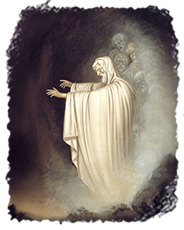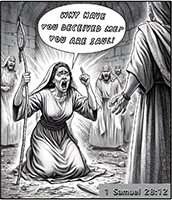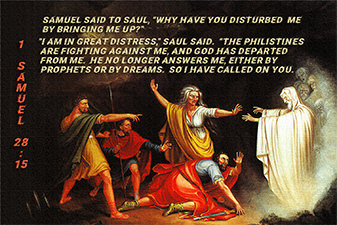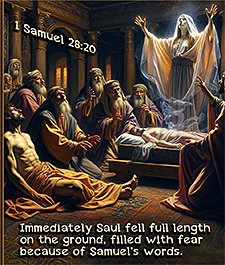1 Samuel 28:1–25 . . . Bible Study Summary with Videos and Questions
“Saul Sees Samuel’s Ghost”
As we have seen throughout 1 Samuel, the Philistines were continually at war with Israel. At the start of chapter 28, it seems that their commanders concluded it was time for yet another military campaign against Israel. Philistine King Achish informed David of his military plan. He then “honored” David by informing him that he'd decided it was time to take him and his men with him as part of his division. David's response to Achish, after the king told him, "You and your men will accompany me in the army," might come as a surprise to first-time readers when he assured Achish, “Then you will see for yourself what your servant can do.” Does David mean what he says in that male macho declaration? He may be so taken by surprise he hardly knows what to say.
When David tells King Achish what he wants to hear, the king will respond to David’s boastful behavior by telling him that he intends to "make him his bodyguard for life" (v. 2). How amazing! David, who once served as Saul’s armor bearer (16:21), will be appointed the Philistine king's bodyguard, and he's about to go to war with the Philistines against Israel. Surely the reader is compelled to ask the question, What's happening to our faithful, God-honoring hero, David?
By far, these are the darkest days of Saul’s life. Chapter after chapter has revealed how King Saul gradually lost connection with God. A series of events occurred leaving Saul frightened to death, experiencing a good case of “foxhole religion.” He attempted to “inquire of the Lord” to learn what he should do to get himself out of the messes in which he found himself. Every one of his efforts to inquire of the Lord had failed. God was there but was silent. In trouble, Saul was unable to obtain divine guidance that might provide him with victory. In today's text, we'll see that he'll do something he'd never done before nor will ever do again.
[Note: Click the link to This Week’s Passage near the bottom of this page to read today’s Scripture.]
God Was with Saul but Was Silent (28:1–7)
Saul’s problems were mounting. First, the Philistines were seriously waging war against the Israelites. The Philistines have continually harassed the Israelites throughout the reign of Saul. But this time, it appears the Philistine king had determined to break the back of Israel’s military might, once and for all, by combining their armed forces at Aphek (29:1). From there, they'll march northward, up through the Plain of Esdraelon to Shunem (vv. 3–25), intending to “divide and conquer” Israel by separating the nation in the middle, then working on the northern and southern halves independently.
Second, Saul may well have heard that David was among the Philistines who'd assembled to attack Israel. If Saul dreaded facing off with this massive Philistine army, he may also have been shaken to learn that David was with them. Our chapter begins with the account of Philistine King Achish informing David that he and his loyal men will go to fight the Israelites. David assured Achish that he'd prove himself a worthy ally, to which Achish responded by informing David that he'd become his bodyguard for life. Imagine how Saul felt about going up against David, especially after he'd previously said to David: "Now look, I realize that you will in fact be king and that the kingdom of Israel will be established in your hand" (24:20), and "you will both accomplish much and surely prevail" (26:25).
Third, Saul was aware of the danger he was in and became desperately afraid. As a result, this pending full-scale, all-out attack by the Philistines had all the signs of a devastating defeat for Saul and his army; the author informs us that Saul was scared to death because "terror filled his heart" (v. 5).
Fourth, although Saul was about to desperately “inquire of the Lord,” he wasn't able to get a response from God. He wasn't experienced in seeking God’s will, as our text has shown up to this point. Unlike David (see 22:10, 15), Saul wasn't accustomed to seeking divine guidance. We're told that Saul “inquired of the Lord” (v. 6), but his wasn't a genuine inquiry. Instead, it was a desperate attempt to get God to bail him out of trouble.
Saul then said to his attendants, “Find me a woman who is a medium, so I may go and inquire of her.”
“There is one in Endor,” they said (1 Sam. 28:7).
Saul’s uneasiness progressed from fear, to terror, to sheer panic. He had to do something drastic because he sensed impending doom. The Philistines were camped in Shunem while Saul and his army were camped in Gilboa. The Philistines were poised to attack, and Saul knew he didn’t stand a chance, so he supposed that he must act quickly. He made a desperate and dangerous decision: Since he couldn't get God’s attention in any of the conventional ways, he decided to inquire of a medium (a fortune teller).
Saul Seeks a Medium (vv. 8–14)
Having now read vv. 8–14, this is one of the few occasions when Saul sought divine guidance, but his efforts would be made too late. In desperation, he looked to the grave for guidance. He didn't seek guidance from heathen deities, but from Samuel, the deceased prophet. In order to do so, he had to employ a medium, which, of course, was a clearly forbidden act in the Laws of Moses. Having removed the mediums and magicians from the land (v. 3), Saul instructed his servants to find a medium, the witch of Endor. Disguising himself, he went to her and asked her to conjure up Samuel. The woman was terrified when Samuel appeared to her. All indications suggest that it was really Samuel; his message to Saul was certainly consistent.
Obviously, God had forsaken Saul. He'd given the Israelites several ways to receive His guidance, but those means were no longer available to Saul. The Spirit had left him; he didn't receive dreams from the Lord (16:13–14); he'd killed the priests who were prepared to inquire of the Lord for him; and Samuel, the prophet he'd relied on for counsel, had died. So Saul, desperate to determine the future of this coming battle with the Philistines, by any means, turned from the Lord to illicit means, thus damning him further.
Mosaic Law is clear: The Israelites were to stay away from these occultists and stone them (Leviticus 19:31; 20:27; Deuteronomy 18:10–11). We hearty Christians must also stay away from any kind of sorcery, magic, or witchcraft that seeks the future by occult means or by consulting the dead.
Saul had rightly banished mediums from his realm, however, they'd merely gone underground. With some inquiry, Saul's attendants were able to find one rather quickly. Saul asked the medium in Endor to "bring up Samuel" for him (v. 11). That she did, but what happened next was surprising, which is why she shrieked at the top of her lungs, realizing that her client was none other than King Saul (v. 12).
This plan to inquire of a medium has its own set of problems, which we can see from the text: (1) God had strictly forbidden the use of mediums; (2) the Philistines were in Shunem while the Israelite army was in Gilboa, and Endor was approximately eight miles north of Gilboa — to get there, Saul had to sneak past the Philistines; and (3) Saul couldn't afford to be identified along the way. His solution involved traveling by night and disguising himself by wearing common-man apparel on this mission.
When Saul arrived at the medium's home, he got right to the point, first seeking a commitment from the medium that she'd conjure up whomever he named. She resisted at first (v. 9), fearing this might be one of Saul’s “sting” operations; she didn't want to be caught directly disobeying the king’s orders. Ironically, Saul swore to her, "as surely as the Lord lives," that she wouldn't be punished for doing what he'd ask of her (v. 10). The medium knew that she was speaking with the king. Either she was really good at her job or Saul was a terrible master of disguise. Nevertheless, he then asked the woman to conjure up Samuel for him; she didn't need to ask for further clarification. When she saw Samuel, she shrieked. She not only recognized Samuel, she also recognized that the one asking her to bring him up was none other than Saul himself, who again assured the woman he wouldn't harm her and then asked her to describe the person whom she'd seen. Her response to seeing Samuel, and her description of him being "a ghostly figure coming up out of the earth" (v. 13), seems to indicate that this was no ordinary conjuring. So Saul bowed down with his face to the ground and "prostrated himself" (v. 14).
Samuel’s Ghost Condemns Saul (vv. 15–25)
Saul was terror-stricken upon visualizing Samuel's spirit arising from death in front of him. Seeing how affected Saul had become, the witch of Endor fed him; thereafter, he and his men got up and went out into the night. Saul realized that, the following day he and his sons would be killed and face God alone — a sobering, dire situation for anyone. [Source of artwork (left)]
During the years when Saul and Samuel were both alive, Samuel spoke to Saul candidly on God's behalf. He didn't tell Saul the things that he wanted to hear. In fact, Samuel sometimes feared for his own life, when doing what he knew would infuriate Saul (see 16:2). In chapters 13 and 15, Samuel rebuked Saul for his sins, telling him frankly that he would eventually lose his kingdom. In light of these things, what in the world would Saul expect Samuel to say to him now? If he expects anything different because a medium had conjured up Samuel from the dead, Saul would be in for a very rude awakening.
16Samuel said, “Why do you consult me, now that the Lord has departed from you and become your enemy? 17The Lord has done what he predicted through me. The Lord has torn the kingdom out of your hands and given it to one of your neighbors — to David (1 Sam. 28:16–17).
Samuel seems “grumpy” when he asked Saul, “Why do you consult me?” He could have said this because he didn’t like being disturbed by Saul. Or, he could have asked that as a rebuke to Saul for doing something he shouldn't have done — conjuring up the spirit of one who was dead. Either way, Samuel’s disapproval was evident. Saul sought to justify his actions by telling Samuel that he was most distressed. The reason, he added, was that the Philistines were waging war against him and that God had departed from him, refusing to answer his inquiries.
Samuel wasn't impressed by Saul's approach. He wouldn't tell Saul what to do. Moreover, he rebuked Saul for asking him to do what would have been impossible. Saul was totally on his own. But, since he'd gone to the effort of having Samuel conjured up, Samuel would tell Saul exactly how things were then, between him and God, and what tomorrow's future held. The situation Saul found himself in was precisely that which Samuel had revealed in his announcements to Saul when he spoke for God in chapters 13 and 15. Saul was now experiencing the fulfillment of Samuel’s earlier prophecies.
Speaking concisely, Samuel told Saul what would happen to him and why. As Samuel had indicated to Saul earlier, God had torn the kingdom from Saul’s hands and was giving that kingdom directly to David, Saul’s “neighbor.” This was because of Saul’s disobedience in failing to fully carry out God’s instructions concerning Amalek. Samuel was now telling King Saul that the words of Samuel’s prophecy, spoken to Saul in chapter 15, were now being fulfilled. Accordingly, the next day, God would give Israel, Saul, and his sons over to the Philistines; he and his sons will be killed. Samuel said it as bluntly as could be said, “Tomorrow you and your sons will be with me” (v. 19).
What happens next in the text isn't very pretty. Saul was fearful when he'd gone to the medium that night. As a result, he literally became unglued; his knees buckled when he heard Samuel's words. He fell to the ground, paralyzed. In part, this was the result of his having had nothing to eat for some time. In addition, he was fatigued from traveling those eight or so miles from his camp in Gilboa to Endor. But a lot was due to sheer terror.
The woman then appealed to Saul to listen to her and take her advice. After all, that would have been the least he could have done for her since she'd risked her life for him. She pled with the king to let her fix him something to eat that would give him strength to carry on. He refused; his appetite was gone. The woman and Saul’s servants prevailed upon him to eat, not simply because he was hungry but because he needed strength to return to his camp. Like the father of the prodigal son had done, the medium of Endor killed and prepared the fatted calf (see Luke 15:22–24, 29); but it wasn't for a celebratory feast, nor was it because a prodigal had repented and returned; it was more like a wake. She slaughtered the calf and prepared it and some bread. The king ate, then went out into the night. It was the darkest part of Saul’s life. Alas, an even darker day — the next day — was yet to come. It'll be when Samuel’s prophecies will be fulfilled.
† Summary of 1 Samuel 28:1–25
This passage presents one of the most dramatic and tragic episodes in Saul’s life: his encounter with the medium at Endor. As war looms with the Philistines, Achish trusts David and wishes to make him his bodyguard for life (28:1–2). Meanwhile, Saul faces the Philistine army’s advance near Shunem. Filled with fear and anxiety, Saul seeks guidance from the Lord, but God gives him no answer — neither by dreams, Urim, nor prophets (vv. 3–6).
Desperate, Saul resorts to forbidden means. He disguises himself and, with two attendants, visits a medium at Endor — a practice he himself had banned from Israel (v. 7–8). Saul asks the medium to summon Samuel from the dead; the woman, terrified upon realizing Saul’s identity, is reassured by Saul that no harm will come to her (vv. 9–12). When the medium succeeds in calling Samuel’s spirit, Saul falls to the ground in fear (vv. 13–14).
Samuel — now appearing as an apparition — declares God’s judgment: The Lord has departed from Saul and has become David’s ally (vv. 15–19). He reminds Saul of his past disobedience regarding the destruction of the Amalekites and pronounces doom: Saul and his sons will die in battle the next day, and Israel will fall into Philistine hands.
Overwhelmed and physically exhausted, Saul collapses, refusing to eat. The medium and Saul’s men plead with him until he accepts food. She prepares a meal of unleavened bread and a fattened calf. Saul eats, regains some strength, and departs into the night (vv. 20–25).
Key points with verse references:
• The Philistines prepare for war; Achish expects David to fight for him (vv. 1–2).
• Saul is terrified of the advancing Philistines, but God does not answer his desperate prayers (vv. 3–6).
• Saul seeks out the medium at Endor, disguised and accompanied by two men (vv. 7–8).
• Saul asks the medium to summon Samuel; she realizes Saul’s identity, but he reassures her (vv. 9–12).
• Samuel’s spirit appears, rebukes Saul for his disobedience, and announces impending defeat and death for Saul and his sons (vv. 13–19).
• Saul is devastated and refuses to eat, but eventually accepts the medium’s meal and departs at night (vv. 20–25).
This chapter powerfully illustrates Saul’s spiritual decline — the loss of divine guidance, resorting to forbidden practices, and the final pronouncement of judgment — all pointing toward the end of his reign and foreshadowing David’s rise.
This Week's Passage
1 Samuel 28:1–25
New International Version (NIV) [View it in a different version by clicking here; also listen to chapter 28 narrated by Max McLean.]
† Summary Video: “The First Book of Samuel”
† Watch this introductory video clip created by BibleProject on bibleproject.com.
- Q. 1 Why do you think God condemns occult practices such as communicating with the dead?
- Q. 2 Up to this point in our drama, are you more like David or Saul right now?




